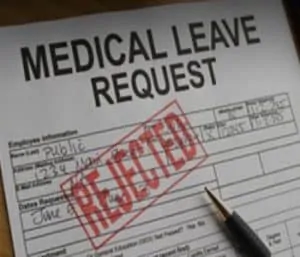Family Medical Leave Act

Who Is Covered?
Basically, there are 2 questions lawyers ask when determining if a worker is covered under FMLA.
- Have you worked for your employer for at least 1 year before requesting leave?
- Do you work at a location where your employer employs 50 or more employees?
If you answered “yes” to both of the above questions, you work for a covered employer and are eligible for qualified FMLA leave. Employees of government agencies and public schools are eligible for FMLA leave regardless of the number of other employees in the area
Serious Health Condition
FMLA provides 12-weeks of unpaid leave to care for themselves or a family member for a “serious health condition.” This means an illness, injury, impairment, or physical or mental condition that involves an overnight stay in a hospital, hospice, or residential medical care facility or continuing treatment by a doctor for a period of more than 3 consecutive days. Any period of incapacity due to pregnancy or for prenatal care is considered a “serious health condition” under FMLA.
Conditions for cosmetic treatments like plastic surgery is not considered serious health conditions unless inpatient hospital care is required or unless complications develop. Again, unless complications arise, the common cold, the flu, earaches, upset stomach, minor ulcers, headaches, routine dental problems, are examples of conditions that do not meet the definition of a serious health condition and do not qualify a worker for FMLA leave.
Notice Requirement
Under FMLA you give “proper notice” to your employer of your need for FMLA leave if you notify your employer of your need for leave in a timely manner and in a way that alerts your employer that your absence might qualify as FMLA leave – even if you did not expressly mention FMLA.
If you knew of the need for leave more than 30 days before leave was to begin you are required to give your employer at least 30 days advanced notice before leave was to begin. If you knew of the need for leave less than 30 days before the leave was to begin, you are required to give your employer notice as soon as was reasonably possible.
More Information
- What Situations Qualify For The Family Medical Leave Act?
- My Employer Wants Proof That I’m Really Ill. Do I Have To Provide Medical Records?
- Can My Employer Require Me To End My FMLA Leave Early?
- My Employer Has Refused To Grant My Request For Leave. Can They Do That?
It’s important that you contact a FMLA lawyer as soon as possible so you don’t miss any important deadlines. You should also contact a FMLA lawyer if you feel you’re confused bout providing proper notice to your employer.

Call Now For A Personalized Consultation
(954) 546-7608
